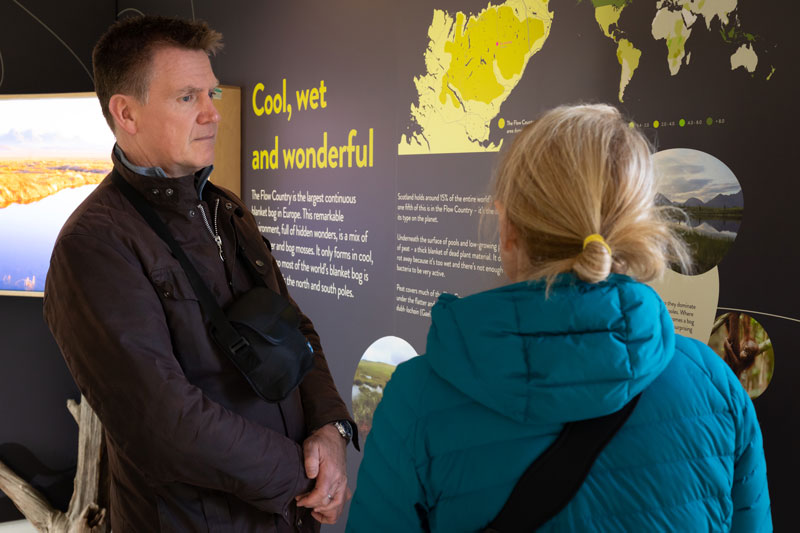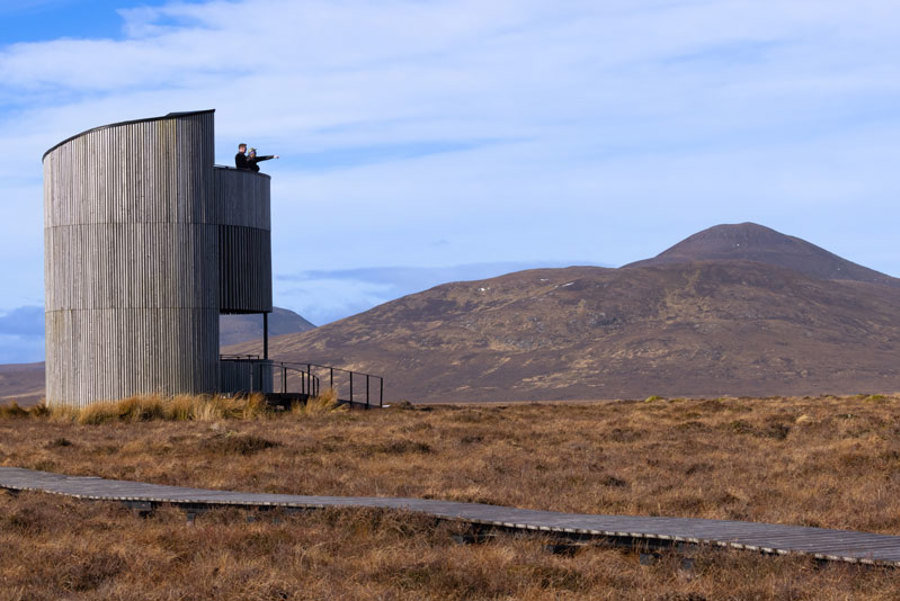
How our partnership with RSPB Scotland is bringing nature into the heart of our business - and why we’re encouraging others to collaborate too
IN 2022, the EICC entered into a partnership with RSPB Scotland, in an effort to restore one of the world’s most important, if undervalued habitats, the peatlands of Scotland. In doing so we are contributing to carbon mitigation and restoring nature.
We speak to EICC Chief Executive, Marshall Dallas, after a recent visit to Forsinard, the site of RSPB Scotland's peatland restoration work.
In Scotland, around 20% of our landmass is made up of peatland and we are home to the largest blanket bog in all of Europe. They are incredibly special habitats, made up of highly adapted plant species and home to a range of rare and important wildlife. Peatlands are also important for people. Most of Scotland’s drinking water is filtered through peatlands, therefore requiring fewer chemicals to treat. They can also absorb carbon from the atmosphere and lock it up in peat, making them an important ally in the bid to tackle climate change.
Shockingly, of the 1.8 million hectares of peatland in Scotland, it is estimated that as much as 80% of it is in a degraded condition. This affects their ability to capture carbon, provide home for wildlife and produce clean water. In fact, degraded peatland emits around 1.3 gigatonnes of CO₂e globally each year – that is roughly equivalent to the annual emissions of the UK, France, Spain, the Netherlands and Greece – combined.
“Through our partnership with RSPB Scotland, we are supporting the restoration of Scotland’s peatlands so we can achieve three things,” explains Marshall Dallas, Chief Executive of the EICC. “Firstly, we can restore the natural equilibrium and stop CO₂ emissions from degrading peatlands being released into the atmosphere. Secondly, in time, the mosses and boggy flora will re-establish themselves and begin once again sequestering carbon from the atmosphere. Finally, we can preserve this beautiful habitat for wildlife, so that future generations can enjoy and appreciate our wonderfully unique Scottish environment.”
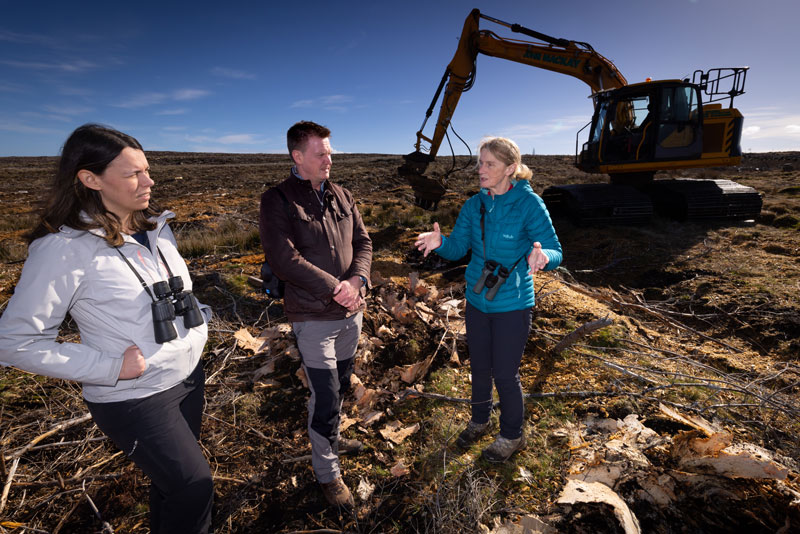
The power of collaboration
“I believe it’s the moral responsibility of every business to take steps to reduce their environmental impact and preserve our planet for future generations to come”
Marshall Dallas, EICC Chief Executive
Marshall recently visited the Forsinard Flow Nature Reserve in the Flow Country where RSPB Scotland’s Peatland restoration is taking place. “I witnessed first-hand the amazing work that RSPB Scotland’s full-time team and their volunteers do up there,” said our CE of his trip to the Highlands. “Protecting 21,000 hectares of Scottish landscape cannot be easy, but I was struck by the caring, collaborative and passionate way that the team conducted their day-to-day business of conservation and sustainability projects, landscape conservation, satellite tracking of birds and being a centre for conservation science.
“As someone who loves Scotland and its natural offerings, Forsinard really struck a chord with me, both professionally and personally. RSPB have a great understanding of what they offer the natural world and society, but they also recognise what the gaps are and who they need to collaborate with to fill them. I totally relate to this approach because a large part of EICC’s success is derived from its ability and willingness to collaborate and partner meaningfully with other skilled organisations.”
“To make the biggest impact on nature and climate, we need to work together. What we have with RSPB Scotland is the beginning of what I hope is a powerful, long lasting and transformative partnership with substantial benefits for nature, the climate, people and, crucially, the economy.”
A business opportunity
The cost of restoring all of the UK’s peatland has been estimated at £20 billion, but the benefits of restoring this natural ecosystem would top £100 billion. Playing our part in saving nature doesn’t just make moral sense, it makes business sense.
“We need to think about absolutely everyone we do business with – from suppliers of source materials, through stages of manufacture to end product, to help ensure that consideration of effect on nature is brought right to the fore”
Anne McCall, director of RSPB Scotland
Highlighting this fact to businesses across the country is the goal of a new series of short films commissioned by the RSPB, WWF and the National Trust. At the EICC, we recently had the pleasure of hosting the Scottish premiere of the first of these films, Save Our Wild Isles: The Business of Nature.
Almost 200 guests from the local Edinburgh business and academic community registered to attend to learn from the film and discuss – with each other and host charities RSPB Scotland and WWF Scotland – what they can do to tackle the nature emergency, both as individual businesses and through collaborating with other businesses, charities, and Government.
“I believe it is the moral responsibility of every business to take steps to reduce their environmental impact and preserve our planet for future generations to come,” said Marshall, speaking at the event. “Through Step Change - our sustainable business programme - we are well on our way to doing just that. For example, our Event Impact Reports detail both the positives and negatives of any event held at the EICC. Allowing clients to set environmentally focused targets for future events and strive to achieve a greener and more sustainable future for our industry. Our partnership with RSPB Scotland allows us to give something back by investing in nature-based solutions to tackle and mitigate the impact of climate change and the devastating loss of nature.”
It is this nature-positive approach to achieving net zero which is key, for us at the EICC, for the businesses who gather here, and for the wider business community across the country. We hope others can follow our lead in putting the nature and climate emergencies front and centre of their business strategies.
“The work the EICC Team is doing to integrate sustainability and consideration for nature and climate into their business model is hugely welcome,” said Anne McCall, director of RSPB Scotland, who also spoke at the film screening.
“I think there is often a tendency for many organisations and businesses to think in restrictive terms about their footprint and impacts, and that needs to change. We need to think about absolutely everyone we do business with – from suppliers of source materials, through stages of manufacture to end product, to help ensure that consideration of effect on nature is brought right to the fore.”
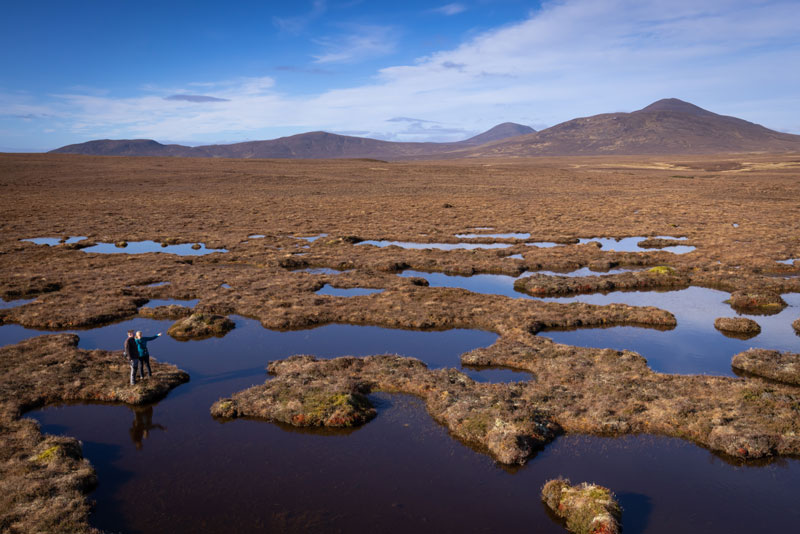
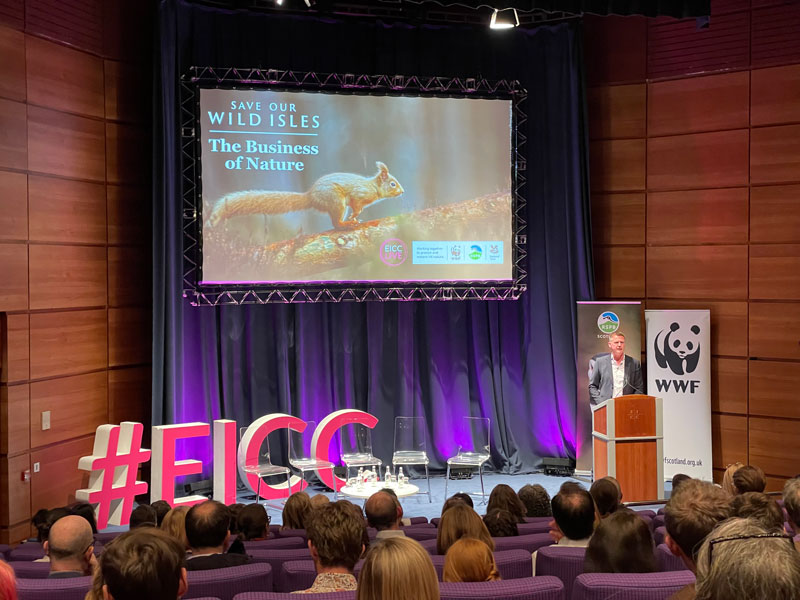
Business leader Deborah Meaden, who appears in the film, is optimistic about the future, assuming businesses take urgent action. “I am confident that we can tackle the nature and climate crises – humans are very good at solving problems,” she said. “What I am worried about is whether we can do it in time, and this is where businesses can play a major role - in accelerating action, driving innovation and seizing the many business opportunities that the inevitable changes to the global economy will bring.”
To learn more about how businesses can embrace a nature-positive approach and how essential this is to our future, you can watch the film on the Save Our Wild Isles website.

Steps to change
As part of their Save the Wild Isles campaign, the RSPB Scotland and WWF Scotland outlined five key actions businesses should be taking to put nature and climate front and centre of their strategy
- Ensure nature is at the heart of business decision-making
- Assess their relationship with nature - their dependencies and impacts to include in transition plans
- Set targets that are science based, measurable and time-bound
- Take action for nature - stop destroying nature and reduce the impact of production and consumption
- Use the power of their business to advocate for change across industries, suppliers, government, colleagues, relevant industry bodies and peers to protect and restore nature
